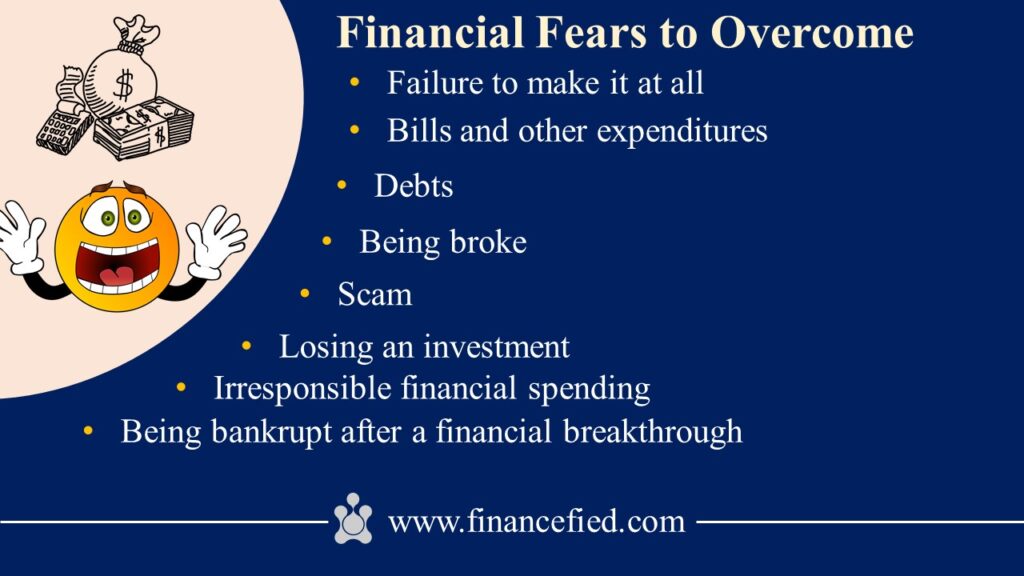As one grows older, financial accountability and responsibility kicks in. Financial responsibilities and accountability subjects many people to different financial fears.
Overcoming these fears is not the easiest but going past them is a significant step in life. Below are some common financial worries that people have:
Financial Fears to Overcome
1. Failure to make it at all
This is majorly a long-term fear that people have about their financial life. The current financial status might not to bother them so much, but future financial life bothers them big time. A person with a big dream and vision cannot take this for imagination.
People identifies their future life with certain individuals in their immediate society. If one aspires to live like their role models, anything less becomes hard to accept. One feels motivated to do what it might take to match their aspired level of financial success.
Some people will study hard; others will accept to work overtime, and others will even accept the two jobs. Whatever it is, one has to do to make it; they will do it with all guts it takes.
2. Being broke
Many people are afraid of being broke generally. A reminder that one has to call for financial favors can be mentally exhausting. The desire for financial freedom makes most people wake up early for a job, take an investment and even save as much as they can.
All these, among other financial strategies, ensure a constant flow of income that one has. It is a way of cushioning oneself from reliance on relatives’ or friends’ financial favors.
Easy to say, relying on others for personal expenditures is among other financial fears that really hurts.
3. Being bankrupt after a financial breakthrough
Thinking about financial breakthrough is common for most people. However, some people go beyond thinking of financial freedom. Some people cannot imagine enjoying a financial breakthrough only to be bankrupt in the future. To some, this is quite disturbing even as they enjoy financial freedom and breakthrough. What makes this scary is the change of lifestyle from a good lifestyle to merely a survival lifestyle.
Take, for instance, having a breakthrough in a music career only to become irrelevant after a short while. The pressure to agree with new life after the loss of financial freedom is immense. To those who are enjoying financial freedom, thinking about becoming dependent on others dares them to work harder to suppress their financial fears.
4. Scam
A scam is among the most frustrating financial fears for many people. Imagining your hard-earned money taken away from you in a scam scheme is hard to imagine.
People who are afraid of being scammed do not buy any ideas at ease. They do due diligence to ascertain the legitimacy of a deal before they can get any money out of their pocket.
5. Debts
Some people are afraid of debt from different angles. There is someone afraid of borrowing money in the first place. They prefer to spend within their mean rather than borrowing. Such people often convince themselves to back off from seeking any loan facility. Thus, they work hard to have enough to afford their expenditure.
To others, they fear debt default more than taking a loan. When such a person thinks what follows after defaulting on a loan, the burden of such presumed dark moments becomes huge. As a precaution, they only take loan amount they’re certain on repayment.
A person who fears debts also considers if their support system has capacity to bail them out of a loan default.
6. Bills and other expenditures
Paying bills is a financial obligation that bothers many. If there was any way out of bills, most people would opt for it. Receiving high gross pay to pay bills and remain with small disposable income is frustrating. At times it makes one feel like their hard work is underpaid.
Bills differ for different people depending on one’s lifestyle and overall obligations. For instance, a nearing due date for a rental bill feels unwanted for some people. Other people fear paying legal, financial obligations, such as taxes, school fees, and parking fees.
7. Irresponsible financial spending
There are those who fear spending the little they have in a bad way. Defining a bad way of spending depends on a person or even their immediate society. Such people will distance themselves from activities resulting to bad habits of expenditure.
8. Losing an investment
Leave alone above financial fears and imagine losing an investment. Losing an investment is common but thinking about how one can feel after a lost investment causes twitches. The pressure of managing such loss can be high. This is why risk averse people prefer to be conservative with their earnings and savings.
If investment’s return is uncertain, a person fearing losing takes time to buy idea of possible return.
Summary

